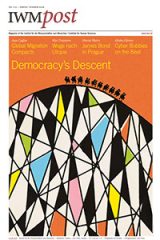

In collaboration with
Institute for Human Sciences
The Institute for Human Sciences / Institut für die Wissenschaften vom Menschen (IWM) is an independent institute for advanced study in the humanities and social sciences. Since its foundation in 1982, it has hosted more than 1500 scholars, journalists and translators from all over the world. Many of the Institute’s Permanent and Visiting Fellows are regular contributors to Eurozine or its focal points The World in Pieces and Ukraine in European Dialogue (see below).
Website: www.iwm.at
X (formerly known as Twitter): https://x.com/iwm_vienna
Youtube: https://www.youtube.com/channel/UCIwFQ_iRX8w8D0NKJo41Ihw

Articles
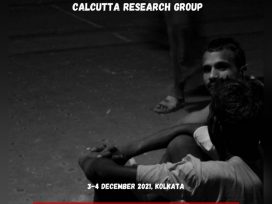
Reporting on migrants and refugees in Europe and Asia
Virtual discussion on 3 Dec at 4PM IST (11:30 CET)
Tune in for a live conversation with journalists on how migration and refugees are represented in India, Thailand and Bangladesh, in contrast with European media trends.
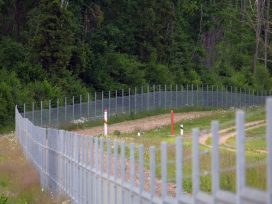
The migrant crisis at the Polish–Belarusian border is being used by Lukashenka to divert international attention from the repression of the democratic opposition. But it also suits PiS, which by staging the crisis as a battle for Polish sovereignty is shoring up support among its own electorate. Still, the rest of Europe cannot simply point the finger.
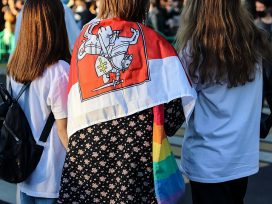
Sisterhood behind bars
Female solidarity in Belarusian prisons
A former Belarusian political detainee reveals the remarkable depth of cohesion and trust between women activists confined for weeks in overcrowded prison cells.
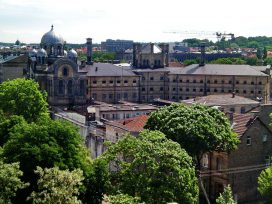
Former communist prisons in Russia, Lithuania, Poland and Belarus have become contested public spaces of memory. With buildings in various states of disrepair or neglect, the redevelopment of several is now being considered. But can they realistically function as both sites of remembrance and mixed-use spaces that look to the past and future simultaneously?
Focal points

Inspired by a lecture that Clifford Geertz delivered in 1995 at the Institute for Human Sciences in Vienna, this focal point engages with ‘deep diversity’, ‘a sense of dispersion, of particularity, of complexity and of uncenteredness’ rather than unified world order. It follows the launch of a research programme of the same name at the institute in January 2023.

Post-revolutionary Ukrainian society displays a unique mix of hope, enthusiasm, social creativity, collective trauma of war, radicalism and disillusionment. With the Maidan becoming history, the focal point ‘Ukraine in European Dialogue’ explores the new challenges facing the young democracy, its place in Europe, and the lessons it might offer for the future of the European project.
Projects and publications
